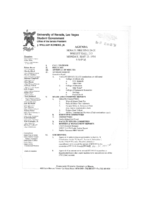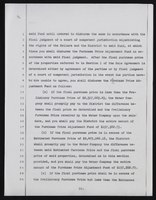Search the Special Collections and Archives Portal
Search Results
Hazel Baker Denton Photograph Collection
Identifier
Abstract
The Hazel Baker Denton Photograph Collection (1910-1961) is comprised of photographic prints and one negative of the Denton family and friends, primarily taken in Nevada and Utah. Many photographs depict life in small Nevada towns, particularly Caliente. Photographs also depict Utah, Oregon, Washington D.C., and California, and unidentified desert and forest landscapes throughout the American West.
Archival Collection
Charles A. Hendel Notebook
Identifier
Abstract
The Charles A. Hendel Notebook is comprised of one notebook of poetry and prose written by Charlie Hendel between 1960 and 1976. Topics include the state of Nevada, World War II, American nationalism, and biographical materials about Charles Hendel.
Archival Collection
Nevada Division of State Parks Photograph Collection
Identifier
Abstract
The Nevada Division of State Parks Photograph Collection (approximately 1910-1940) contains black-and-white photographic prints and some corresponding negatives that depict state parks and recreational areas throughout southern Nevada. The images also portray Lake Mead, Hoover Dam, Logandale, the Valley of Fire, and Mount Charleston as well as images of actors filming on location in southern Nevada.
Archival Collection
Richard Bryan oral history interviews
Identifier
Abstract
Oral history interviews with Richard Bryan conducted by Kristin Guthre on November 10, 2011 and an unknown date for the Boyer Early Las Vegas Oral History Project. Bryan begins by discussing his father’s time as a law student in Washington, D.C. and the influence his father had on his decision to pursue law. Bryan then chronicles moving to Las Vegas, Nevada in the 1940s and growing up in the Huntridge Community near Charleston Boulevard. Bryan recounts attending both the University of Nevada, Reno and the University of California, Hastings College of the Law in San Francisco, California. Bryan describes his experiences in the Las Vegas District Attorney’s office and the Army Reserve. He then recalls his political career as a member of the Nevada Senate, his role as the Attorney General of Nevada, the Governor of Nevada, and as a United States Senator. Lastly, Bryan discusses political issues in Nevada and the United States during his time in office such as debates about renewable energy, environmentalism, and preservation.
Archival Collection
Helen E. La Plant oral history interview
Identifier
Abstract
Oral history interview with Helen E. La Plant conducted by Claytee D. White on October 08, 2003 for the Boyer Early Las Vegas Oral History Project. La Plant begins by discussing her early life in Minneapolis, Minnesota during the 1920s and 1930s and joining the United States Army at the age of twenty-one. La Plant then describes serving in Okinawa, Japan after World War II as a photographer for the Signal Corps. La Plant describes her return from Japan and decision to attend photography school in New York City, New York. La Plant then chronicles her experiences moving to Las Vegas, Nevada in the late 1950s to work at the Nevada Test Site as a photographer. She then recounts the shift from aboveground atomic testing to underground testing and her role as head of the photography department at the Nevada Test Site. Lastly, La Plant talks about entertainment during the 1960s in Las Vegas.
Archival Collection
Flora and Stuart Mason oral history interview
Identifier
Abstract
Oral history interview with Flora and Stuart Mason conducted by David G. Schwartz on February 27, 2010 for the Remembering Jay Sarno Oral History Project. Flora Mason begins by discussing the relationship between her family and the Sarnos. Mason describes that she and her husband socialized with Jay and Joyce Sarno in the 1960s because they lived on the same street in Las Vegas, Nevada. Stuart Mason recounts how the Sarnos were incredibly friendly and Jay occasionally invited him to play golf. Mason then chronicles his role as a contractor and the work he did for Jay Sarno throughout his career. He talks about how many of the development ventures of Sarno's were funded by Jimmy Hoffa and the Teamster’s Union. Lastly, Mason discusses how Sarno understood the gaming industry more than any other casino operator and how that was attributed to the success of Caesars Palace.
Archival Collection

Transcript of interview with Tony Scodwell by Lisa Gioia-Acres, September 29, 2008
Date
Archival Collection
Description
Tony was born the only son of the only son in Beloit, Wisconsin. Following his parents divorce when he was 12, he and his father went to live with his grandparents who, he admits, spoiled him. While neither of his parents played a musical instrument, Tony’s grandmother was a professional organist. In addition, Tony had an uncle who was a professional saxophone player and who was an inspiration to him. Tony’s dad was very supportive of his decision to learn trumpet and rented Tony an instrument, took him to his lessens, and sat with him while he practiced. Tony was firm in his convictions by the 9th grade that he was going to be a musician. Following high school, Tony was awarded a full scholarship to the Berklee School of Music in Boston which was a very prestigious music school. Tony repeatedly left school to go on the road which the school fully expected of their students. The last time he left the school he never went back. Tony states he got his degree on the road with experience from playing in bands like Stan Kenton, Tommy Dorsey, and with his idol Harry James. Tony took his career abroad when he took up residence in Cologne, Germany to play with a band there. Tony came to Las Vegas to play in a band with Buddy Rich which turned out to be of a shorter duration than he expected. Tony then played in Las Vegas and Reno for a time before going back on the road after realizing he preferred playing jazz on the road as opposed to playing in show bands. After eight years on the road, Tony returned to Las Vegas, got married, and settled down. Aptitude tests proved accurate when they showed Tony had a talent for things mechanical and metal as Tony went on to manufacture trumpets in addition to playing them. One can feel the love Tony has for his trumpets as he describes the process of creating them. After playing trumpet for almost 30 years, Tony decided it was time to concentrate on his photography for a while. Tony does not consider himself retired, but rather he likes to play, take pictures, and, of course, he practices the trumpet every day.
Text

Transcript of interview with Jan Kennedy by Barbara Tabach, September 7, 2011
Date
Archival Collection
Description
Jan Kennedy was born (1924) Janet Parmelee, the daughter of a Connecticut physician and a homemaker. In high school she met Norman Kennedy, who she would marry after both had attended college and to whom she was married for 64 years. Until 1963, their roots seemed to be taking hold in the Seattle area. That is until Norm was offered an attractive career opportunity as a weather man at the Nevada Test Site. They settled in and enjoyed a zest-filled life with their four sons and a dynamic group of friends who they often entertained at their cabin in Mount Charleston. In addition, Jan managed to volunteer for a list of organizations including UMC Hospital/Southern Nevada Memorial Hospital; Clark County Museum Guild; Salvation Army Women's Auxiliary; church deacon; Assistance League; Red Hats—keeping herself ever busy and joyfully satisfied.
Text

Meeting minutes for Consolidated Student Senate University of Nevada, Las Vegas, May 23, 1994
Date
Archival Collection
Description
Text

